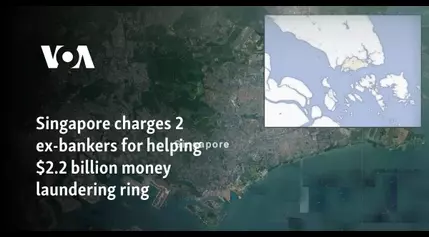Finance

Uncovering Singapore's Biggest Money Laundering Scandal: A Tale of Bankers Aiding Foreign Criminals
In a shocking revelation, a Singapore court has charged two former bankers for their involvement in a staggering .2 billion money laundering scheme, the largest financial crime ever seen in the Asian financial hub. The case, which has captivated the city-state, has prompted reforms and raised questions about the vulnerabilities within the banking sector.Exposing the Intricate Web of Financial Corruption
The Bankers' Complicity: Facilitating Illicit Transactions
The two former bankers, Wang Qiming and Liu Kai, were employed as relationship managers at Citibank and Swiss private bank Julius Baer, respectively. They are accused of assisting a group of foreigners who were convicted last year of laundering the colossal sum. Wang faces 10 charges, including laundering nearly 0,000 and forging loan documents, while Liu is charged with using a forged Chinese tax document to help one of the convicted money launderers open a Julius Baer bank account in Switzerland.The Unprecedented Scale of the Crime
The sheer scale of the crime has captivated Singapore, with authorities conducting simultaneous raids and arresting 10 foreigners holding multiple passports. The 10 convicted money launderers were sentenced to jail terms ranging from 13 to 17 months, before being deported and barred from re-entering the country.The Regulatory Response: Reforms and Investigations
The case has prompted reforms in Singapore, including measures to make it easier to prosecute money laundering cases. Authorities have also set up an inter-ministerial panel to review the anti-money laundering process and inspect financial institutions suspected of involvement. In June, the government acknowledged that Singapore's banking sector poses the highest money laundering risk in the city-state, underscoring the urgency of addressing this issue.The Vulnerability of Singapore's Financial Sector
The revelation of this massive money laundering scandal has raised concerns about the vulnerability of Singapore's financial sector to illicit activities. The involvement of bankers in facilitating these transactions highlights the need for stricter oversight and more robust due diligence measures within the industry.The Wider Implications: Reputational Damage and Global Scrutiny
The case has not only shaken Singapore's reputation as a safe and reputable financial hub but has also drawn global attention to the city-state's ability to combat financial crimes. The reforms and investigations prompted by this scandal will be closely watched by the international community, as Singapore seeks to restore confidence in its financial system and maintain its position as a leading global financial center.

